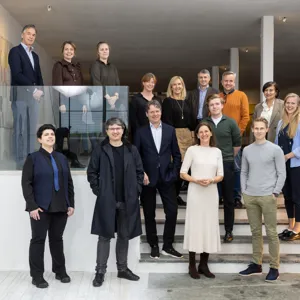In Norwegian
Node leader: Charalampos Tzoulis
Charalampos Tzoulis, MD, PhD, is a professor of neurology and neurogenetics at the University of Bergen and Haukeland University Hospital, Bergen, Norway. He is also Co-Director of Neuro-SysMed and Director of the DECODE-PD, KG Jebsen Centre for Translational Research in Parkinson’s disease. An internationally recognised expert in movement disorders and neurodegeneration, Prof. Tzoulis has made significant scientific contributions, particularly in understanding mitochondrial dysfunction and NAD metabolism in PD.
The PD Node is globally acknowledged for implementing full-cycle translation – from the laboratory to the bedside and back – and being a world leader in NAD-replenishment therapy for neurodegeneration. The Node’s work has constituted the foundation for multiple clinical trials across neurodegenerative diseases at the Centre and globally.
Node activities
Basic and translational research at the PD Node has nominated mitochondrial function and NAD-metabolism as promising therapeutic targets primarily for PD and, by extension, other neurodegenerative and neuroinflammatory disorders, including Alzheimer’s disease, ALS, and MS. Inspired by these findings, the PD Node conducts multiple clinical trials of NAD-replenishment therapy, with a broad range of objectives ranging from establishing safety and pharmacokinetic profiles, to determining the optimal biological dose for brain diseases, and testing efficacy in delaying or preventing PD and other parkinsonisms. Moreover, this research has catalysed several other NAD-replenishment trials at the Centre, targeting Alzheimer’s disease, ALS, and MS (see respective sections).
In addition, the PD Node is working actively on setting the foundations for individualised medicine in PD, by running an international initiative aiming to stratify PD according to underlying molecular mechanisms and develop biomarkers for patient selection for tailored therapies. Notably, in 2024, they published groundbreaking results identifying for the first time a subtype of PD characterised by severe and widespread mitochondrial dysfunction. To enable tailored treatment, they run world-class translational research aiming to identify novel therapeutic targets and candidate therapies for PD and emerging subtypes thereof.
Furthermore, the PD Node leads and is currently establishing a multiarm multistage (MAMS) platform trial for PD – one of five initiatives in the world – as well as the first ever globally trial accelerator and derisking platform designed to assess target penetration and engagement of promising treatments for PD.
During 2024, the PD Node made key advances in their clinical research projects, which include nine clinical trials, and two prospective cohort studies.
See an overview of the clinical studies on the page PD and clinical studies.
You might also be interested in the article: Isolated REM Sleep Behavior Disorder – A Unique Opportunity for Prevention in Parkinson’s Disease
